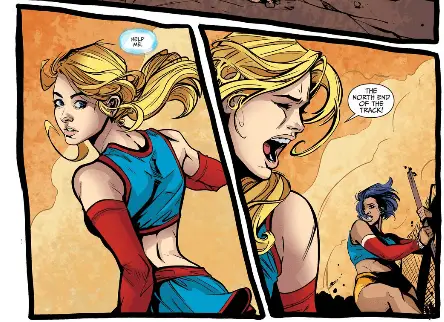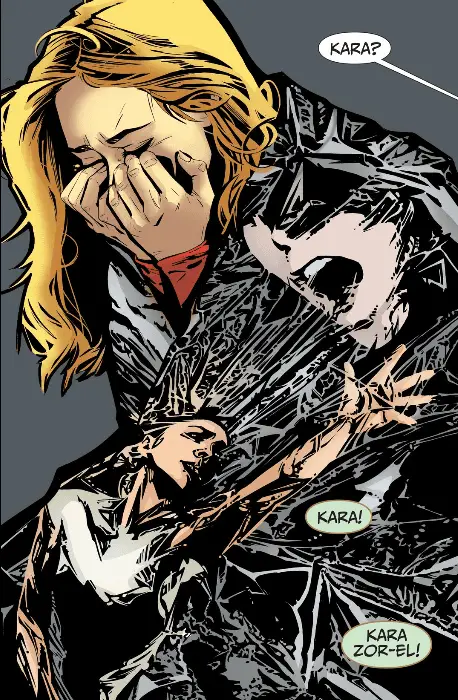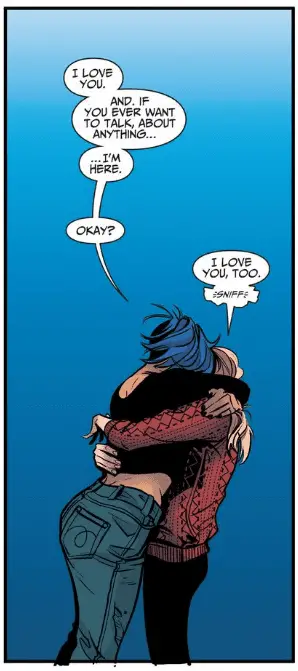DCTV might be in full swing, but that doesn’t mean I can’t appreciate a break from grown-up Kara Danvers to dive back into teen Kara Danvers with Supergirl: Being Super 2. And I must say, I was not only not disappointed, I’m fucking floored at how well this issue dealt with the experience of grief and loss. I rarely ever see adult media handle it this well, so seeing it in media aimed at teens brings me to tears. As I’ve said before, this is the kind of storytelling I would have wanted as a teen and can still deeply appreciate as an adult.
In order to fully discuss the powerful, impressive work Tamaki and Jones have done exploring grief, this review will of necessity include spoilers. So if you don’t want to be spoiled, go out and read it and then come back; it’s damn good.
Why pick this up?

Having read this issue, I stand by and reiterate my statement from the first issue that Tamaki and Jones are a YA Supergirl dream team. Tamaki’s emotive writing pairs beautifully with Jones’ gorgeous linework and sense of movement and flow. I get lost in the story and visuals and have to remind myself that I’m reviewing this and not just reading for pleasure.
This issue digs deep into the experience of loss, so it can be a gut-wrenching read. However, it’s so true to life that I couldn’t put it down. Nevertheless, there’s some humor sprinkled in that works well that fits perfectly with the subject matter. Add in scenes of women supporting each other and a mysterious subplot surrounding Kara’s powers and past, and I’m sold.
What I Loved

Once again, Jones and Tamaki impress me with the synchronicity between the writing and artwork. Jones’ use of color and contrast highlight the tone Tamaki sets in her writing; she knows when to be minimalist to highlight one specific frame without losing precision in the background. Tamaki’s writing, in turn, brings depth and emotion to the imagery; it’s hard to tell where one creative mind ends and the other begins. They’re a well-matched pair, and I can’t imagine one without the other.
Jones’ flowing linework captures Kara’s on-the-ground movements in a way that is reminiscent of flight (see first image above), and we get twists on classic Superman/Supergirl poses in new contexts that enrich their symbolism. Plus, I just really love Dolly’s hair and the way it’s drawn (I might be biased because it’s basically a longer version of my current color/cut); I also love Kara’s wardrobe and want to steal half of it. Jones has a great sense of movement and can capture motion without the need to resort to the overuse of sound effects, which I deeply appreciate since I’m not a huge fan of written sound effects.
Once again, Tamaki’s experience writing tough issues like depression, shines through. Kara processes the death of her best friend Jen in an honest and true-to-life way. Inner thought process and visual body language work together seamlessly. We know exactly what aspect of grief Kara is working through without having to label it specifically in the text, which is a testament to Tamaki’s skill.
“I’ve eaten all the cereal in the house and I still feel like a black hole.”
The lack of reality, feeling empty paired with Kara wrapped up in a blanket and devouring all the cereal she can get—clearly shock. Denial and bargaining come into play when Kara goes for a run and can’t quite accept the fact that Jen is gone. There’s anger and depression mixed in there too, yet all written without resorting to tired clichés. The writing feels both fresh and raw, and it will punch you right in the feels.
“Oh my god, all I do is cry. My heart feels like an old sponge.”
The messy back and forth between stages of grief is one of the things I appreciate most about how Tamaki writes Kara. As someone who has gone through the loss of loved ones fairly recently, I can testify to the fact that grief is not linear. It’s a messy ball of emotions that ebb and flow. Memories can spring up on you suddenly, like when Kara goes for a run and then breaks down in anger before sobbing.
The issue also captures the line between darkness and hilarity that often accompanies grief in the dialogue and texting between Kara and Dolly. Grief can take many forms. Dolly’s “Never die, okay? Or I will kill you.” is just the kind of line we expect from teenagers grappling with grief, and Dolly in particular (have I mentioned how much I love her?) Using macabre, dark humor is an outlet for grief much overlooked in media depictions of it, so I appreciate that Being Super manages to portray it in a realistic way.
 I also appreciate the friendship and support depicted alongside Kara’s loss and grief. She might be struggling, but she has an excellent support system in place that is refreshing to see in teen media that typically thrives on the angst of isolation. Kara’s mother is especially meaningful in this regard, though both of Kara’s parents find their own ways to support her in a manner that is both fitting for their character and actually helpful. Dolly and Kara’s friendship and love resonates on every page they’re together, and I adore how supportive Kara’s coach was about everything, even if there’s a layer of mystery there. It’s rare to see women supporting each other in a crisis, yet Being Super offers us not just one, but three different female characters in Kara’s support network. I am so here for this.
I also appreciate the friendship and support depicted alongside Kara’s loss and grief. She might be struggling, but she has an excellent support system in place that is refreshing to see in teen media that typically thrives on the angst of isolation. Kara’s mother is especially meaningful in this regard, though both of Kara’s parents find their own ways to support her in a manner that is both fitting for their character and actually helpful. Dolly and Kara’s friendship and love resonates on every page they’re together, and I adore how supportive Kara’s coach was about everything, even if there’s a layer of mystery there. It’s rare to see women supporting each other in a crisis, yet Being Super offers us not just one, but three different female characters in Kara’s support network. I am so here for this.
Seriously, I could keep going. There’s so much to love about this comic. The pacing and tone for this issue work well with the heavy subject matter. It gives a weighty issue its full due and is never undermined by the growing mystery surrounding the yellow glow that affects Kara’s powers, her emerging memories about her past, and who it is that might be testing her (and presumably her cousin?). The handling of Kara’s dad not wanting to talk about her powers resonates with the teen experience of having other secrets their parents might not want to talk about—like sexual orientation or gender identity—due to fear or confusion. And, unlike much of television last year, they managed to not kill of the LGBT character (YAY!).
They also have yet to insert a love interest, which I’m deeply grateful for. As important as romantic and/or sexual relationships are in teenage experience, it would only burden this narrative given how much else Kara has going on. Given how much media produced for teenagers, especially teen girls, tends to inject relationship angst where it isn’t necessary, Tamaki and Jones’ laser like focus on their desired thematic arc stands out and stands tall.
Some Nitpicks
Honestly? I got nothing.
Is it worth continuing?
10/10. All the kudos, all the love, all the heart-felt thanks for exploring grief in such a poignant and honest way. April 26th can’t come fast enough.

The TL;DR
Wholeheartedly Approve
- flawless marriage of art and writing
- honest, raw, and true-to-life exploration of grief
- women supporting women
- Kara and Dolly’s friendship
- Kara’s supportive parents
- intriguing mystery subplot regarding Kara’s past and identity that doesn’t distract from the main theme
- tight focus, good pacing, great characters, compelling themes
Eh, I Could Do Without It

Images Courtesy of DC Comics
Supergirl: Being Super 2 Credits
Writer: Mariko Tamaki
Artist: Joëlle Jones
Colorist: Kelly Fitzpatrick
Letterer: Saida Temofonte
Cover: Jones & Fitzpatrick

